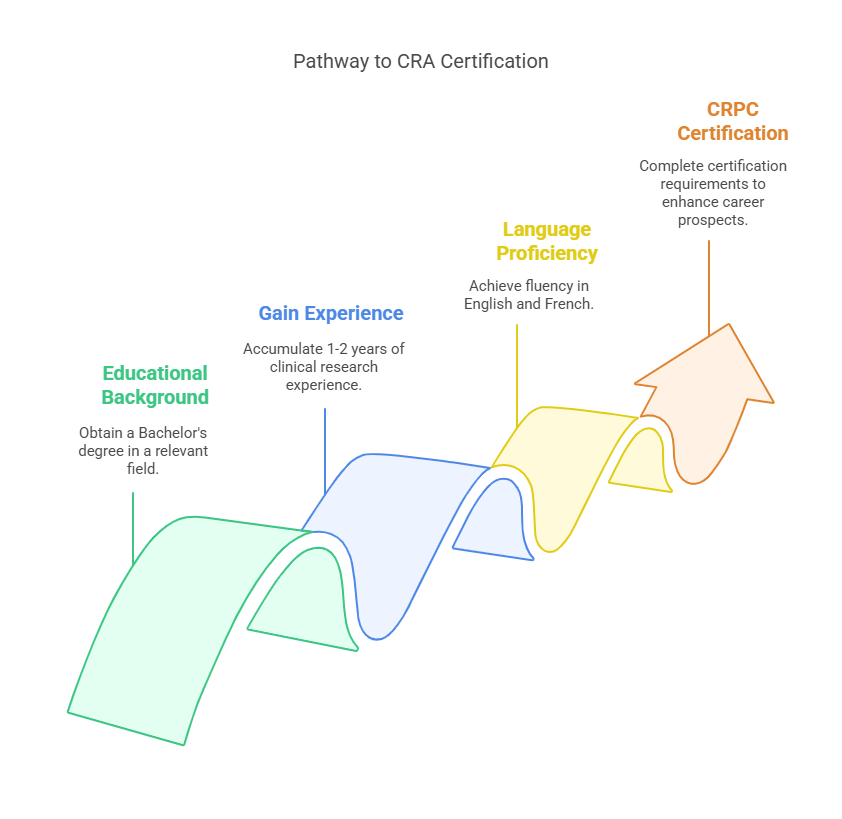Becoming a CRA in Canada Work Guides
So, you want to become a Clinical Research Associate (CRA) in Canada? Welcome to the world of science, travel, and regulatory madness! If you’ve ever dreamed of a career that lets you play detective in the lab while sipping coffee in different time zones, then buckle up. This guide will take you through every step of becoming a CRA in Canada, updated for 2025. Let’s dive in!
What is a Clinical Research Associate (CRA)?
A Clinical Research Associate (CRA) is responsible for monitoring clinical trials, ensuring compliance with Good Clinical Practice (GCP) guidelines, and acting as a liaison between pharmaceutical companies and research sites. CRAs are essential in bringing new medical treatments to market, making this a career with high demand and great earning potential.
Why Choose a CRA Career in Canada?
Job Security
Canada’s healthcare and pharmaceutical industries are rapidly expanding, ensuring a consistent demand for skilled professionals in clinical research. With the rise of biotechnology, medical advancements, and increasing clinical trials, the need for CRAs has never been greater. Unlike many industries prone to economic fluctuations, the clinical research sector remains stable, making it a secure career choice.
Competitive Salaries
The demand for experienced CRAs is on the rise, leading to lucrative salary packages and attractive benefits. Entry-level CRAs in Canada can expect to earn a solid starting salary, with significant growth potential as they gain experience. Mid-level and senior CRAs enjoy six-figure salaries, making this career path both financially rewarding and professionally fulfilling. Many employers also offer bonuses, travel reimbursements, and other perks that further enhance earning potential.
Travel Opportunities
One of the most exciting aspects of being a CRA is the opportunity to travel. Many CRA roles involve monitoring clinical trials across multiple locations, requiring domestic and international travel. Whether visiting different provinces within Canada or attending global research conferences, CRAs get to experience diverse work environments and network with international professionals. This travel component makes the job dynamic and appealing for those who enjoy exploring new places while working.
Diverse Work Environment
A CRA interacts with a variety of professionals, including doctors, scientists, regulatory specialists, and clinical trial coordinators. This multidisciplinary work environment allows CRAs to gain exposure to different aspects of the medical and pharmaceutical industries. The ability to collaborate with diverse teams enhances problem-solving skills and broadens professional expertise, making the role both intellectually stimulating and rewarding.
Career Growth
A career as a CRA offers numerous pathways for advancement. Many professionals start as Clinical Research Coordinators (CRCs) or Clinical Trial Assistants (CTAs) before transitioning into CRA roles. With experience, CRAs can move into senior positions, such as Lead CRA, Clinical Project Manager, or Director of Clinical Operations. Some experienced CRAs also transition into regulatory affairs, medical writing, or pharmaceutical executive roles. The field offers a structured career trajectory with plenty of opportunities for professional growth and specialization.
Salary Expectations for CRAs in Canada (2025 Update)
According to the latest industry reports, CRA salaries in Canada vary by experience and location:
Entry-level CRA: C$57,000 - C$65,000 per year
Mid-level CRA (3-5 years): C$75,000 - C$95,000 per year
Senior CRA (5+ years): C$100,000 - C$130,000 per year
Freelance CRA: Hourly rates can range from C$50 to C$120, depending on expertise and project scope.
The salary range depends on various factors such as location, employer, and level of responsibility. CRAs working in major research hubs like Toronto, Vancouver, or Montreal tend to earn higher salaries than those in smaller cities. Additionally, working for large pharmaceutical companies, government agencies, or global clinical research organizations (CROs) can provide better compensation and career benefits.
Requirements to Become a CRA in Canada
Educational Background
A Bachelor’s degree (B.A. or B.S.) in life sciences, pharmacy, nursing, or a related field is the minimum requirement.
A Master’s degree or PhD can be an advantage, especially for those aiming for senior CRA or project management roles, but it is not mandatory.
Professional Experience
Employers typically look for 1-2 years of clinical research experience, which can include working in clinical trials, medical monitoring, regulatory affairs, or data analysis.
Experience in data management, quality assurance, or laboratory settings is also valuable and can be a stepping stone into a CRA role.
Some professionals start as Clinical Research Coordinators (CRCs) before transitioning into a CRA position.
Language Requirements
Since Canada has two official languages, fluency in both English and French is highly preferred.
Many clinical trials operate nationwide, requiring CRAs to communicate effectively with research sites in both linguistic regions.
Certification Options
The Clinical Research Association of Canada (CRAC) offers certification as a Clinical Research Professional of Canada (CRPC). Although not mandatory, this certification significantly improves career prospects and helps professionals stand out in a competitive job market.
CRPC Certification Requirements:
Option 1: At least 2 years of full-time clinical research experience within the last 5 years.
Option 2: 3,500 hours of part-time clinical research experience, with at least 1 year in Canada.
Option 3: A post-graduate certificate in clinical research + 1 year of experience in Canada.
Why is Certification Important?
Increases job opportunities and salary potential.
Demonstrates a higher level of expertise and credibility.
Opens doors to senior positions and leadership roles in clinical research.
Explore Courses for Clinical Research Career
Courses Available:
Conclusion
Becoming a Clinical Research Associate (CRA) in Canada is a rewarding career with strong job security, competitive salaries, and exciting travel opportunities. By meeting the educational and certification requirements, gaining hands-on experience, and continuously improving your skills, you can build a successful career in clinical research. If you want expert guidance to fast-track your journey, CCRPS offers specialized training programs to help you excel in the field.














